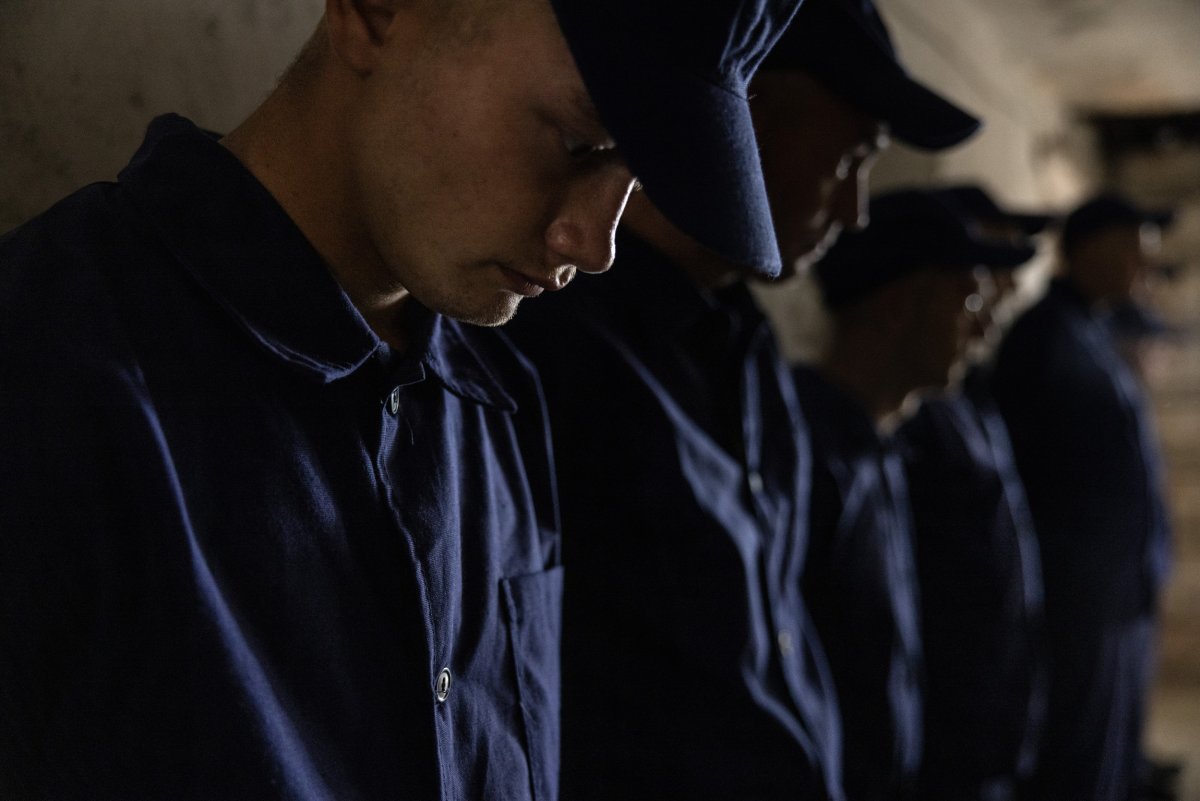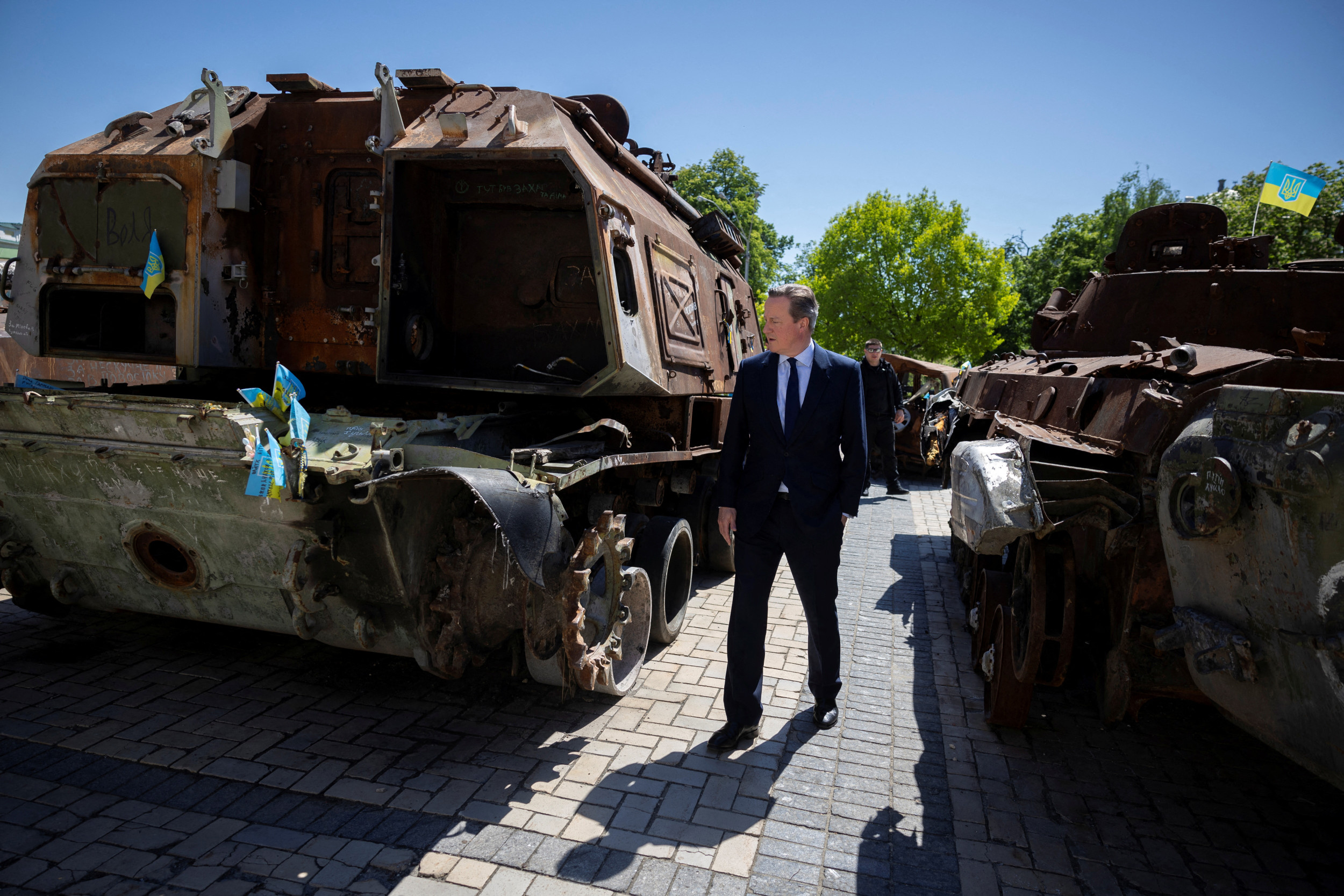Russia has recruited over 100,000 convicts from penal colonies to fight in Ukraine since the war began in February 2022, Newsweek has found.
The figures, which reveal the scale of what critics say are Russian President Vladimir Putin's predatory recruitment methods, were provided by Russian dissident-in-exile Vladimir Osechkin, who is the head of the Gulagu.net anti-corruption project, a prisoners' rights group. He is believed to have a vast network of informants inside Russia's prison system.
Osechkin shared with Newsweek a list of some of the recruited prisoners, which he said was supplied by a source in Russia's Federal Penitentiary Service (FSIN), as well as images from security footage within a prison. The overall figures were corroborated by the head of another group that advocates for prisoners' rights in Russia.
The scale of the prisoner recruitment highlights the acute manpower shortages the Kremlin is facing, experts said. It also demonstrates Putin's preference for "disposable" personnel rather than mobilizing the young, urban population, they said, which could result in political repercussions. The prisoners recruited include murderers and even a Satanist convicted of the ritualistic killing of four teenagers.
Newsweek has contacted Russia's Defense Ministry via email for comment.

How Russia's Prison Recruitment Began
It has been known for some time that Russia has been recruiting extensively from prisons to support its war efforts in neighboring Ukraine—though the full scale of the recruitment had not been revealed until now.
Prison recruitment was kickstarted by the now-dissolved mercenary unit the Wagner Group under its late leader Yevgeny Prigozhin in the summer of 2022, amid reports that the country was facing personnel shortages in Ukraine.
Prigozhin lured them in with pardons from the Kremlin and cash incentives in exchange for six months of service in Ukraine.
However, Newsweek learned that the Kremlin took over that source of manpower earlier this year. Olga Romanova, the head of Russia Behind Bars, a charity advocating prisoners' rights, told Newsweek that Prigozhin stopped hiring in Russian prisons on February 1, and that representatives of the Defense Ministry had for months been recruiting convicts in at least two penal colonies in the Volgograd and Kemerovo regions.
Osechkin told Newsweek that in 2022 more than 49,500 prisoners were recruited nationwide by the Wagner Group, and so far in 2023, the Russian Defense Ministry has hired more that 52,000 convicts to fight in Ukraine.
In total, more than 100,000 Russian prisoners have been offered pardons to fight, and every week more than 1,000 of them are killed in the war, Osechkin said.
Osechkin said he received the information from officers inside Russia's FSIN system, the country's federal executive body responsible for the detention of suspected and convicted individuals.
"We evacuated four officers this summer and autumn. One of the Federal Penitentiary Service officers gave me access to his Federal Penitentiary Service servers," said Osechkin, who shared with Newsweek images of security footage within Russian prisons, dated August 29 and 30.
The prisoner list shared with Newsweek reveals that elderly men past retirement age have been recruited to fight in Ukraine. Newsweek is not publishing the list over security concerns for both the former prisoners and Osechkin's sources.
The list of prisoners hired from penal colonies in Russia was attached to an email sent by a regional FSIN officer to Osechkin on October 12, 2022. The email said that until the end of the month units made up of convicts would be "involved in the invasion the territory of the annexed regions of Ukraine."
The FSIN officer was referring to Ukrainian regions that were illegally annexed by Russia in September 2022 and are partially under its control: Donetsk, Luhansk, Kherson and Zaporizhzhia.
The officer said the list was issued to a limited number of people, and said it confirmed the dispatch of the convicts "to the territory of Ukraine."
Osechkin's figures were corroborated by Romanova, who said that to date, about 120,000 prisoners have been recruited in Russia.
"Of these, 50,000 were recruited by Prigozhin. The rest were recruited by the Ministry of Defense. The number of deaths is unknown. About 50,000 completed prisoners are now free," Romanova told Newsweek.
Some 1,000 female prisoners have been recruited so far, and the Defense Ministry has mostly hired convicts from the country's ethnic minority republics, including Dagestan in the Caucasus, Yakutia in northeastern Siberia, Buryatia, near the Russia-Mongolia border, and the Krasnoyarsk territory, Romanova said.
Putin "definitely thinks that ethnic minorities are expendable," Vladimir Budaev of the Free Buryatia Foundation, a pro-democracy group based in the United States, previously told Newsweek, after the republics were targeted for recruitment in Russia's partial mobilization decree in September 2022.
Storm-Z Unit
The British Ministry of Defense said in May that Russia's military has "ramped up" its recruitment of prison inmates this year, but the effort has not kept pace with its casualty rate.
Notably, Nikolai Ogolobyak, a Russian man who confessed to being a member of a Satanist sect, and who was sentenced to two decades in prison for killing four teenagers in a "ritual," has been pardoned by Putin in exchange for his participation in the war.
He served for six months with Russia's notorious "Storm-Z" unit, which Russia has used to carry out local pushes on the front lines in Ukraine, his father told Russian publication 76.ru. Ogolobyak's father said he returned from Ukraine on November 2 and is currently living with his mother.
The Kremlin has also been forced to respond to backlash after Putin pardoned Vladislav Kanyus, a man convicted in the murder of his 23-year-old ex-girlfriend, for fighting in Ukraine. He was sentenced last July to 17 years in a maximum-security prison over the murder of Vera Pekhteleva in Kemerovo, Siberia, in 2020.
"They atone with blood for crimes on the battlefield, in assault brigades, under bullets, under shells," Putin's spokesman Dmitry Peskov told reporters on November 10.
At least 17 people who committed high-profile murders—including Kanyus—were issued pardons to fight in Ukraine in 2022 and 2023, according to Agentstvo, a Russian investigative site launched in 2021. The publication said the killers all took part in the war, and some have committed crimes again upon their return to Russia.
Russian Prisoners 'Disposable'
Viktor Kovalenko, a former Ukrainian soldier and journalist, told Newsweek that the recruitment practices demonstrate that Putin "thinks of his people as disposables in his imperial pursuits."
"As even the moderate estimates show that the Russian war casualties mount dramatically," he said.
"So, the criminals from prisons are even more disposable in his eyes. By sending them to die instead of mobilizing the young urban population, Putin buys some time hoping that the victory over Ukraine will fall into his hands soon."
Neil Melvin, director of International Security Studies at British defense and security think tank the Royal United Services Institute (RUSI), agreed, telling Newsweek that the Russian military fights with little regard to causalities.
It throws troops into battle and then brings in fresh units to replace those destroyed, relying on the country's large population and with little regard to life, he said.
"For this kind of warfare, prisoners are viewed by the Russian leadership as a resource that can be used with little risk of major political consequences," Melvin added.
Do you have a tip on a world news story that Newsweek should be covering? Do you have a question about the Russia-Ukraine war? Let us know via worldnews@newsweek.com.
Uncommon Knowledge
Newsweek is committed to challenging conventional wisdom and finding connections in the search for common ground.
Newsweek is committed to challenging conventional wisdom and finding connections in the search for common ground.
About the writer
Isabel van Brugen is a Newsweek Reporter based in Kuala Lumpur. Her focus is reporting on the Russia-Ukraine war. Isabel ... Read more
To read how Newsweek uses AI as a newsroom tool, Click here.








